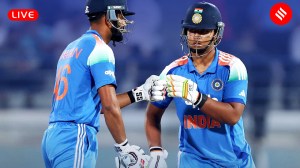The problem with Modi
Nitish Kumar frames the 2014 question the BJP can no longer avoid or deny
In his speech at a JD(U) forum on Sunday,Bihar Chief Minister Nitish Kumar was pointedly looking past the present political moment,at 2014. Declare the NDAs prime ministerial candidate by year-end,his partys resolution urged the BJP,and Nitish laid down the necessary attributes for that leader: someone with an inclusive politics respectful of Indias diversities,someone mindful of the special needs of backward states and minorities,someone like Atal Bihari Vajpayee,someone who is not like Narendra Modi as he is seen today. Of course,that last was not said in so many words; Nitish did not call Modi by his name. Yet,the message was clear for the BJP and all contestants in 2014: Modis undeclared candidature for PM had brought the longstanding and mostly stable BJP-JD(U) ties to a fundamental straining point. Nitish was declaring the contest open for 2014 while spelling out an ultimatum that could reshape the battlefield.
In laying out his preferred set of qualifications for the NDAs prime ministerial candidate,Nitish was doing more than just that. He was also joining in the conversation on governance begun by Modi,and more tentatively by Rahul Gandhi,in their recent public outings,and enlarging it. The Bihar chief minister pointed out that in a country as diverse as India,development has several and contested meanings. And that it might be unwise,if not incorrect,to project and promote one model for all. As Modi attempts to hold up the Gujarat model and his own cache of governance practices and achievements as the repository of India-wide solutions,Nitish was setting out a fundamental question: Can the Gujarat model be abstracted and set down in another state? Can it be replicated in Bihar? Given Bihars trajectory and its political inheritance,its peculiar mix of natural and human resources,and constraints,should it? These questions promise to enrich and widen the public debate on government and governance in the run-up to 2014.
In giving the BJP an extended deadline till year-end Nitish was admitting to the difficulties of his own position. In a state he won on an anti-Lalu consolidation,and with the early optimism draining out slowly in spite of his considerable successes in restoring governance and the authority of the state,every one of Nitishs options outside the NDA fold is freighted with untested variables. For the BJP,however,Nitishs ultimatum frames the urgent challenge it can no longer avoid or deny. In a time of coalition politics and government,it must get down to dealing with the fallout of having as its undeclared PM candidate someone who is seen as a polarising figure with a homogenising project.
- 01
- 02
- 03
- 04
- 05































